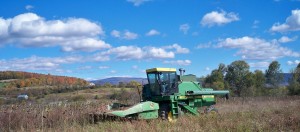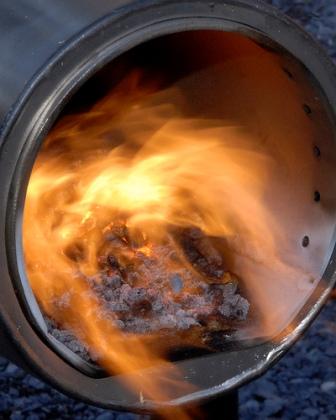Beautiful fields of sunflowers growing in Newbury and Shaftsbury, Vermont will have an unusual future: the flowers’ seeds will be converted to biodiesel and livestock feed. The fuel will be used in Green Mountain Power’s fleet of vehicles and for building heating, saving Green Mountain Power customers money and reducing greenhouse gas emissions and other pollutants. The feed will be used on Vermont farms to supplement animal nutrition.
“Green Mountain Power is leading the way in many local energy initiatives,” said Green Mountain Power President and CEO Mary Powell. “Using Vermont sunflowers to power our vehicles and heat our buildings is a beautiful way to keep our energy local and clean.”
Twenty acres of sunflowers are growing at the State Line Farm Biofuels in Shaftsbury and another ten acres are growing at the Ekolott Farm in Newbury. When the oilseeds are harvested this fall, they will be dried and pressed, then the raw oil will be converted to biodiesel, or B100. The solid portion of the seed, the meal, is valuable as a livestock feed. Depending on the crops’ success, the cost of fuel to Green Mountain Power could be up to one dollar less than current B100 prices.

Sunflowers being harvested at State Line Biofuel Farm in Shaftsbury VT
“It is so great to be part of this innovative test with GMP,” said John Williamson of State Line Farm Biofuels. “Projects like this really help support farmers, plus it’s beautiful to see the fields of sunflowers and even more beautiful to realize it will provide a clean and local power source.”
This pilot is a partnership between Green Mountain Power, UVM Extension, and the Vermont Bioenergy Initiative. UVM Extension and the Vermont Bioenergy Initiative have worked together for several years to encourage the growth of oil seeds as an energy source and the addition of Green Mountain Power is hoped to accelerate this effort even further.
“As a result of the Vermont Bioenergy Initiative, several pioneering farmers in Vermont now have the necessary infrastructure to produce sustainable biodiesel,” notes Chris Callahan, UVM Extension Agricultural Engineer. “This is a unique model: local production for local use. The partnership with Green Mountain Power means more gallons will be made which means lower cost for everyone.”
“The goal is for local biodiesel production to both shave fuel costs for our customers while helping to develop new markets for locally produced liquid fuels,” said Powell. “We see this benefiting local farms and customers as we work together to provide more clean cost-effective and reliable power.”
###
About Green Mountain Power
Green Mountain Power (GMP) serves approximately 265,000 residential and business customers in Vermont and has a vision to be the best small company in America by empowering customers to save money and move to clean energy sources. GMP recognizes the role of electric utilities is changing and is focused on a new way of doing business to meet the needs of customers with integrated services, while continuing to generate clean, cost-effective and reliable power in Vermont. In 2014, Vote Solar named GMP a Solar Champion. More information at: www.greenmountainpower.com.
About the Vermont Bioenergy Initiative
A program of the Vermont Sustainable Jobs Fund, the Vermont Bioenergy Initiative connects diversified agriculture and local renewable energy production for on-farm and community use by supporting research, technical assistance, and infrastructure development in emerging areas of bioenergy including biodiesel production and distribution for heating and transportation, oil crops for on-farm biodiesel and feed, grass for heating, and algae production for biofuels and wastewater management. More information at: www.VermontBioenergy.com.
12 Sep 2014
BTEC Webinar: Energy Farmers
Fall is harvest season in the nation’s agricultural communities, and energy is a crop of growing importance. Understanding the unique characteristics of agricultural residue and grass biomass supply chains is critical to the expansion of these non-woody fuels for conversion to useful heat and power. Join the Biomass Thermal Energy Council’s (BTEC) webinar on Wednesday, October 1st at 1PM ET as speakers Jay Van Roekel of Vermeer and Tom Wilson of Wilson Engineering Services discuss the ins-and-outs of agricultural and grass biomass fuels from the field to the boiler.
Topics to include:
• What types of agricultural residues and grass biomass are at commercial stage for conversion to useful heat and power?
• What are the harvest considerations of agricultural residues and grass biomass?
• How are agricultural residues and grass biomass processed and sized?
• How is this non-woody fuel stored, pre and post sizing?
• Case study: what would it take for dedicated grass energy crops to be a viable option for replacing fossil fuels in thermal applications in the U.S. Northeast?
• Q & A with the speakers







